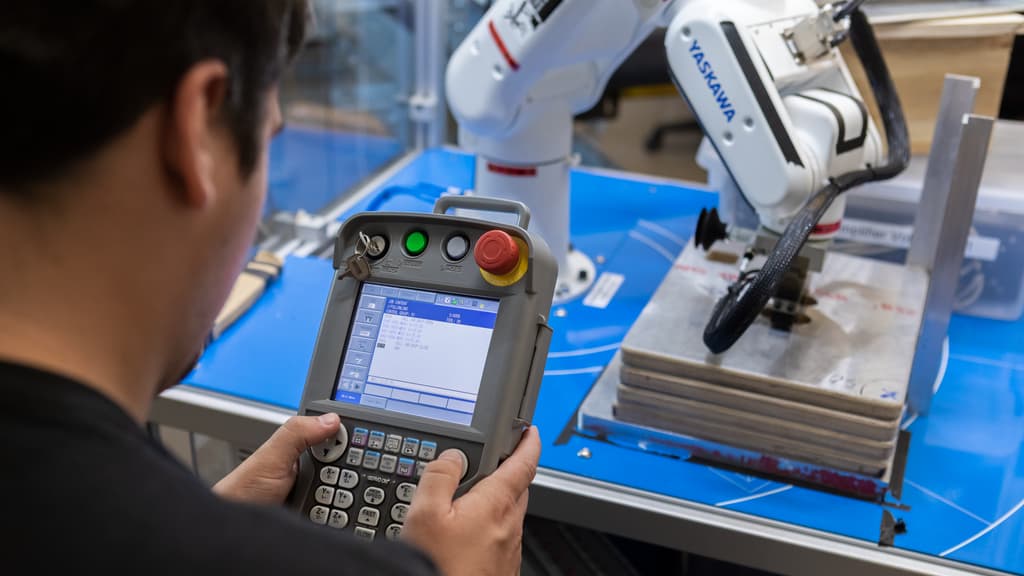How To Become a Robotics Engineer
What Is a Robotics Engineer?
This career can be described as a skilled professional dedicated to the design, development and maintenance of robotic systems. Robotic engineers possess proficiency in areas such as mechanical engineering, electronics and computer science, allowing them to create robots capable of performing a wide range of tasks.
This profession is particularly well-suited for individuals with a passion for technology, problem-solving and innovation. If you find yourself intrigued by AI advancement, or thrive on examining the intricate workings of a fresh device, the field of robotics and automation may be a good career path for you.
What Does a Robotics Engineer Do?
Robotic engineers are a type of mechanical engineers who focus on everything from building, testing and maintaining robots to developing new interfaces for interacting with them. These engineers strategize the implementation of sensors in robots to detect various stimuli, such as light or scent, and they devise the integration of these sensors into the robots' designs.2
These engineers play a crucial role in the development and innovation of robotics, engaging in a wide range of activities that push the boundaries of technology and automation. Below are common tasks routinely undertaken by robotic engineers.

Design and Develop Software
Use programming languages such as Python, C++ or Java to develop software to control robotic systems.
The World Robotics Report of 2023 highlights a landscape of continuous growth within the robotics sector, particularly noting a remarkable 48% increase in new professional service robots, totaling 158,000 new units in factories as of 2022.3 In 2023, the industrial robot market is expected to grow by 7% to more than 590,000 units worldwide.1
Taking relevant coursework, gaining hands-on experience through research and internships, and participating in robotics clubs and workshops may help you stay updated on advancements in the field. Continuing to develop strong problem-solving and communication skills is essential for this field.
In high school, those with aspirations to become robotic engineers can take STEM courses, join robotics clubs and participate in competitions to gain hands-on experience. Additionally, exploring programming languages, engaging in DIY projects and pursuing mentorship opportunities can help you build a strong foundation in troubleshooting and communication.
In college, students who wish to become a robotics engineer may choose to pursue degrees in mechanical or electrical engineering, computer science or robotics engineering. Although the U.S. Bureau of Labor Statistics (BLS) does not specifically categorize robotics engineers, it does provide insight into a subset of mechanical engineering that encompasses robotics engineering, according to the BLS.2 The BLS states that mechanical engineers, a type of robotics engineering, typically need a bachelor’s degree either in mechanical engineering or mechanical engineering technology.4 Mechanical engineers might also pursue graduate degrees in engineering or business administration to explore emerging technologies, expand their knowledge base and refine their project management abilities.4
Engineering certificates can offer specialized training in a shorter timeframe than bachelor's degrees. These programs can help provide valuable insights into the latest technologies and methodologies used in the field, equipping you with the skills needed to excel in robotics-related roles.
Internships can provide you with hands-on engineering experience, allowing you to apply classroom knowledge to practical projects. You can develop technical skills, network with professionals and explore various career paths within robotics engineering. These experiences may help enhance resumes.
As an aspiring robotic engineer, you can pursue various entry-level roles to kickstart your career in the field. Entry-level positions may include automation or robotics technician, where you work on assembly lines, performing maintenance, troubleshooting and repairing robotic equipment under supervision.5
While there isn't a specific professional certification required for all robotic engineers, obtaining relevant certifications can help enhance your credentials and demonstrate proficiency in specific areas of robotics. Some certifications that robotic engineers may pursue include:
- Certified Robotics System Architect (CRSA)
- Certified Robotics Engineer (CRE)
- Project Management Professional (PMP)
Engineers who offer their services publicly are required to obtain licensure in all states and the District of Columbia, which may require a passing score on the Professional Engineering (PE) exam.4 Many states may also require engineers to undergo annual continuing education to renew their licenses.4
Loading Form
Best Degrees for Robotic Engineers
An ideal educational path for aspiring robotic engineers is to pursue a degree in mechanical engineering.4 Within mechanical engineering programs, one can typically expect to encounter coursework spanning mathematics, life and physical sciences, engineering fundamentals and design principles.
In general, degrees that incorporate aspects of mechanical, electrical and software engineering can provide a well-rounded foundation for robotic engineers, empowering them with the varied skill set needed to work in this field.
If you are looking to pursue a robotics engineering career, which is referred to by the BLS as a type of mechanical engineer, you may want to pursue the following degree programs at GCU:
Bachelor’s Programs
- Bachelor of Science in Engineering With an Emphasis in Project Management
- Bachelor Of Science In Mechanical Engineering
- Bachelor of Science (BS) in Mechanical Engineering With an Emphasis in Aerospace
- Bachelor of Science in Mechanical Engineering with an Emphasis in Robotics
- Bachelor of Science in Mechanical Engineering Technology
- Bachelor of Science (BS) in Mechanical Engineering Technology With an Emphasis in Mechatronics
Certificate Programs
When aiming for a career as a robotics engineer, your resume should highlight your technical proficiency and experience in robotics and automation, as well as specific soft skills, such as:6,7
- Programming languages such as C++, Python, and MATLAB
- Programming and controlling robots
- Kinematics, dynamics and control systems
- Robotic platforms
- Computer vision techniques and technologies
- Microcontrollers, sensors and actuators for robot hardware
- CAD (Computer Aided Design) software
- Project management
- Communication
- Problem-solving

Median Annual Wage
A robotics engineer salary may be influenced by factors such as experience, licensure and the employer. While the BLS may not provide specific details on robotic engineering careers, related fields such as engineering and mechanical engineering are relevant to this degree.4 According to the BLS, engineers had a median annual wage of $102,660 as of May 2023.8
Furthermore, according to the BLS, robotic engineers fall under the umbrella of mechanical engineering,4 suggesting that their salary might align closely with that of mechanical engineers. The BLS states mechanical engineers had a median annual wage of $99,510 as of May 2023.9
Where Do Robotic Engineers Work?
This profession intersects with various sectors, including healthcare, agriculture and defense, enhancing efficiency and safety across industries.11 Robotics engineers often work across multiple fields, providing applications for the computer, aerospace, automotive, nuclear, mining, metals and textile industries and more.11 Their skills are needed in a variety of settings, including:13
Office or Laboratory
Many robotics engineers work in an office or laboratory setting, where they conduct research, plan experiments and test their creations.
On-Location or On-Site
Robotics engineers can also serve as field technicians, ensuring their creations are working and that those using them are sufficiently trained in doing so.
Advancement Opportunities Within Robotics Engineering
Mechanical or robotic engineers can perform tasks in environments that humans may find extreme, thus limiting the danger to the human operator. By investing in education and certifications, robotics engineers can work toward enhancing their expertise, which may be able to help expand their potential for professional development and new opportunities in the field.

Start your journey today and shape the technologies of tomorrow by exploring our Bachelor of Science in Mechanical Engineering with an Emphasis in Robotics program and more.
1 Robotics247. (2023, Sept. 26). World Robotics Report 2023 Shows Ongoing Global Growth in Installations, Finds IFR. Retrieved on March 20, 2024.
2 U.S. Bureau of Labor Statistics. (2023, Sept. 6). What Mechanical Engineers Do. Occupational Outlook Handbook. Retrieved on Jan. 30, 2024.
3 World Robotics. (2023, September). Welcome to the presentation of World Robotics 2023. IFR International Federation of Robotics. Retrieved on March 20, 2024.
4 U.S. Bureau of Labor Statistics. (2023, Sept. 6). How to Become a Mechanical Engineer. Occupational Outlook Handbook. Retrieved on Jan. 30, 2024.
5 Linkedin. (n.d.) What are the most common entry-level automation jobs in robotics? Retrieved on March 11, 2024.
6 Indeed. (2022, Sept. 30). Robotics Engineer Skills: Definition, Examples and Tips. Retrieved on Jan. 30, 2024.
7 Burkhard, J. (2023, Jan. 11). What skills should I have on my resume if I want to work as a robotics engineer? Retrieved on Jan. 30, 2024.
8 The earnings referenced were reported by the U.S. Bureau of Labor Statistics (BLS), Engineers as of May 2023, retrieved on May 30, 2024. Due to COVID-19, data from 2020 to 2023 may be atypical compared to prior years. BLS calculates the median using salaries of workers nationwide with varying levels of education and experience. It does not reflect the earnings of GCU graduates as engineers, nor does it reflect the earnings of workers in one city or region of the country or a typical entry-level salary. Median income is the statistical midpoint for the range of salaries in a specific occupation. It represents what you would earn if you were paid more money than half the workers in an occupation, and less than half the workers in an occupation. It may give you a basis to estimate what you might earn at some point if you enter this career. Grand Canyon University can make no guarantees on individual graduates’ salaries. Your employability will be determined by numerous factors over which GCU has no control, such as the employer the graduate chooses to apply to, the graduate’s experience level, individual characteristics, skills, etc. against a pool of candidates.
9 The earnings referenced were reported by the U.S. Bureau of Labor Statistics (BLS), Mechanical Engineers as of May 2023, retrieved on May 30, 2024. Due to COVID-19, data from 2020 to 2023 may be atypical compared to prior years. BLS calculates the median using salaries of workers nationwide with varying levels of education and experience. It does not reflect the earnings of GCU graduates as mechanical engineers, nor does it reflect the earnings of workers in one city or region of the country or a typical entry-level salary. Median income is the statistical midpoint for the range of salaries in a specific occupation. It represents what you would earn if you were paid more money than half the workers in an occupation, and less than half the workers in an occupation. It may give you a basis to estimate what you might earn at some point if you enter this career. Grand Canyon University can make no guarantees on individual graduates’ salaries. Your employability will be determined by numerous factors over which GCU has no control, such as the employer the graduate chooses to apply to, the graduate’s experience level, individual characteristics, skills, etc. against a pool of candidates.
10 COVID-19 has adversely affected the global economy and data from 2020 to 2022 may be atypical compared to prior years. Accordingly, data shown is effective September 2023, which can be found here: U.S. Bureau of Labor Statistics, Occupational Outlook Handbook, Engineers, retrieved on Jan. 30, 2024.
11 Stringent Datalytics. (2023, Sept. 5). Shaping the Future of Healthcare: Robotic Assisted Systems Market Analysis. Linkedin. Retrieved on March 11, 2024.
12 Indeed. (2023, Feb. 3). Robotics Engineering: Duties, Salary and Job Outlook. Retrieved on Feb. 2, 2024.
13 U.S. Bureau of Labor Statistics. (2023, Sept. 6). Work Environment. Occupational Outlook Handbook. Retrieved on Feb. 2, 2024.

